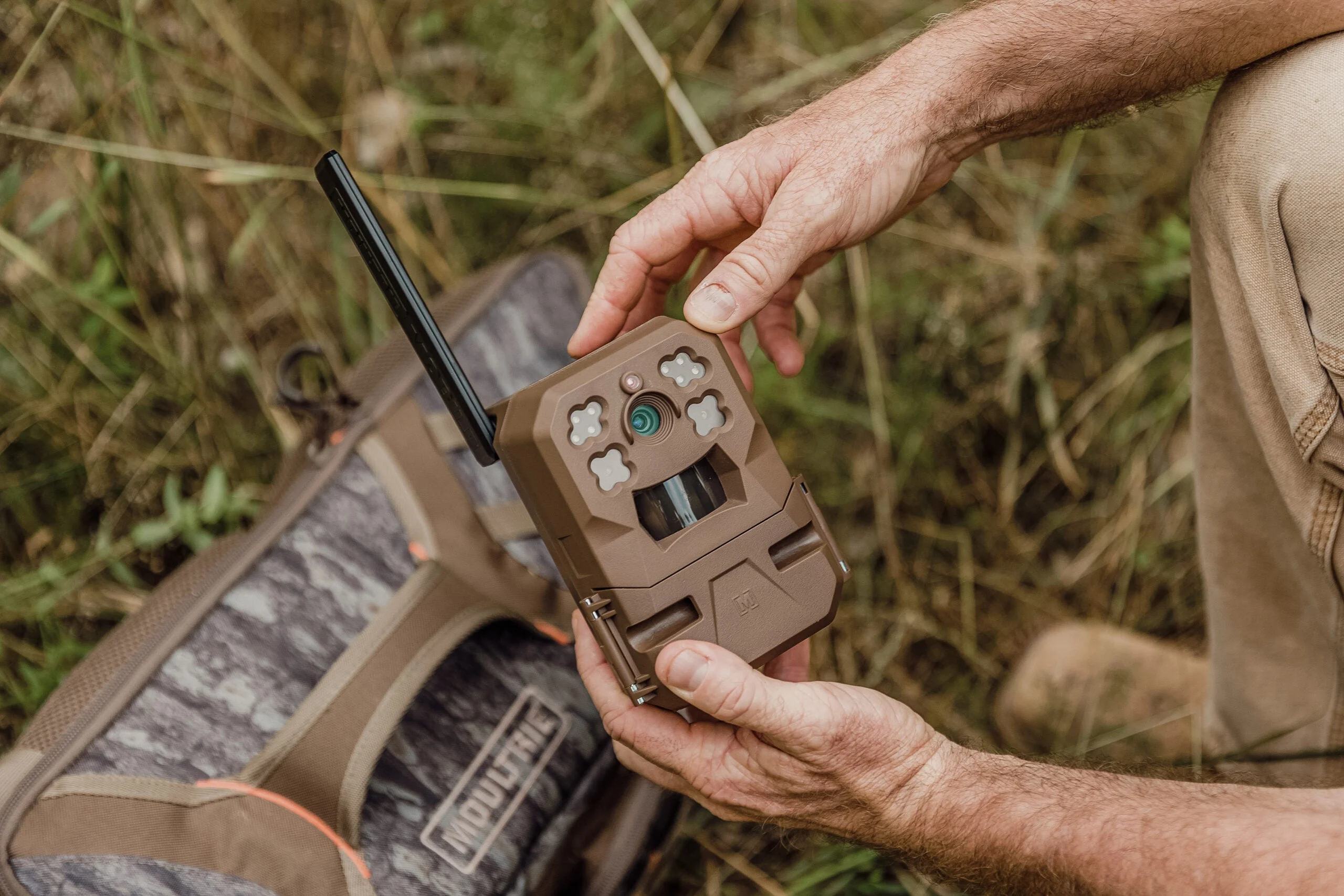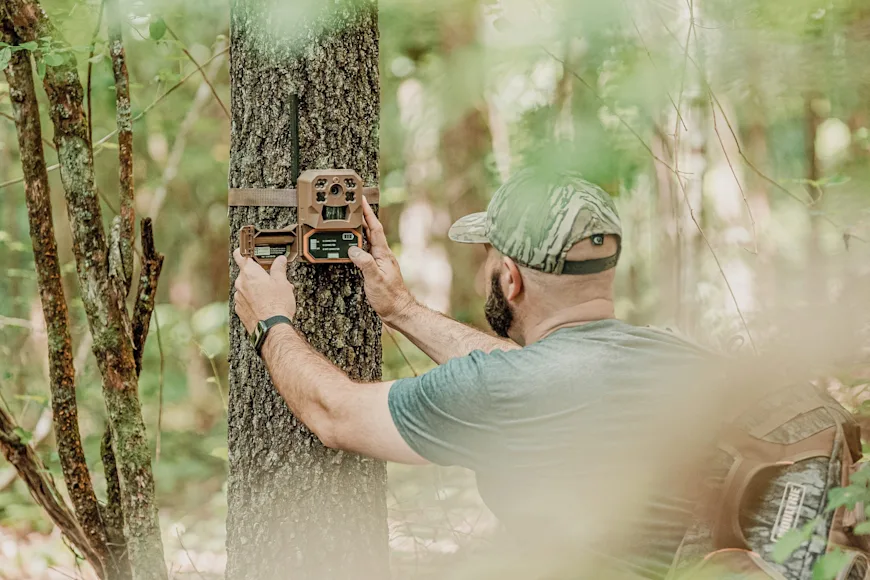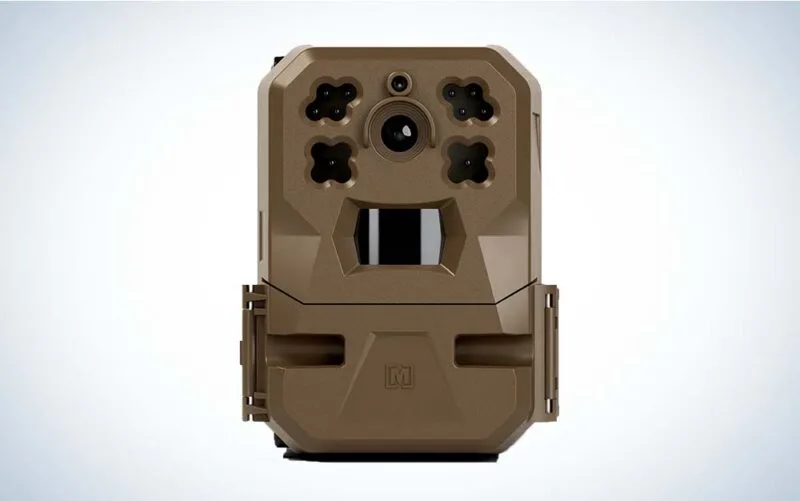We may earn revenue from the products available on this page and participate in affiliate programs. Learn more
Moultrie Mobile has been upping its trail-cam game in recently, and perhaps the best sign of their commitment is the new Edge. This cam is a super-reasonably priced wireless model that not only serves as a good step into cellular–for those not already wading in that pool–but also sports some cool features that are pretty groundbreaking.
The Edge is new for 2022 and, for right around $100, it’s proof that you don’t have to break the bank to own wireless cameras. In addition to an excellent price point, the Edge features “auto connect technology”; rather than choosing a wireless provider, the camera searches for the strongest signal in the area and connects to it automatically. The Edge also doesn’t require installation of an SD card; pics are downloaded in the camera’s internal memory, then sent to the Moultrie Mobile app for viewing. I tested the Edge for ease of setup, picture quality, detection rage, trigger speed, and more. Here’s how it performed.
Specs
Price: $99.99
Camera: 33 MP
Detection range: 80 feet
Trigger speed: .85 seconds
Power: 8 AA batteries
First Impressions
The Edge has a nice-looking case and the controls are easily accessible and pretty simple. To set the camera up you simply install batteries, download the Moultrie Mobile app and follow the instructions—which, even for oldies like me, are pretty easy to follow. When you power up the camera, a series of lights on the side start blinking; these let you know about the battery level and that the camera is searching for a signal. When the latter is achieved, the lights remain on for a second, then shut down. You’re connected and ready to go. If you want to shoot a test picture you simply hit the “connect” button, and the test pic will let you know if you’ve got the unit aimed correctly.
The Moultrie Mobile app is pretty impressive. Not only can you control the camera settings remotely, but the app sports species recognition (allowing you to dismiss pics of possums and raccoons and focus on deer, for example) as well as activity charting that examines your photos and hones in on the best times for deer movement. The app also features interactive maps that allow you to drop pins to mark stands, food plots, cameras, and other pertinent locations. There’s also a weather setting that can keep you informed of temps, barometric pressures, and approaching fronts.
How I Tested It
As noted, I read the instructions, installed the Moultrie Mobile app, then loaded the camera with batteries. I have to admit it was pretty weird not searching for an SD card slot, since the edge doesn’t require an SD card and just uploads the photos to the app. I then mounted the camera on a tree in my yard and did several “walk-through” tests at varying distances to check for trigger speed, detection range, and picture quality. Then I took the Edge out to a small water hole that normally sees some pretty good activity to see how it would perform on real animals under real-world conditions. I left the camera out for three days and reviewed the photos as well as the performance of the app.

The edge is easy to manage via the Moultrie Mobile app. Moultrie Mobile
Performance
There’s a lot to love in any trail cam that costs a C-note, especially a wireless model. So I’m confident the Edge will be a popular choice for any budget-conscious hunter looking to get into the wireless game.
One hurdle that many hunters face as they contemplate entering the wireless market is the fear that they’ll be getting in over their heads. After all, many of the really good conventional cams are simple and intuitive to set up, so when talks of installing apps and running cameras from a phone come up, it can sound intimidating. Trust me, as an aging hunter only marginally comfortable with the high-tech world, installing and running the Moultrie Mobile app is pretty darn simple. Plus, tweaking the camera settings requires zero special skills. If you’re even moderately comfy with technology, the app is awfully cool; in addition to managing photos, it can provide detailed weather reports and mark locations for cameras, stands, deer sign, and more.
As for pure camera performance, I found the color in the Edge pics shot during daylight to be solid and of good quality. Nighttime pics were good, though my unit fell short of the advertised 80-foot detection range. As expected with this unit’s slower trigger, pics were often blurred on any shot involving movement.
Sure, a .85 trigger speed is pretty lethargic in this market; there are plenty of cameras that can best that mark, often by a lot. But that doesn’t keep this cam from being highly useful. Limit the Edge to places where you know deer are going to stop and spend some time (mock scrapes, mineral licks, bait piles, etc.) and it will do just fine. Mount it on a trail or funnel, especially during the rut, (when bucks are typically covering ground in a hurry), however, and it will probably result in some blurry pics. But after years of playing with trail cams, I’ve learned to set each model up in areas where it will perform well. As an economically-priced wireless cam with a stellar app, the Edge will surely find its place in my annual camera lineup.



